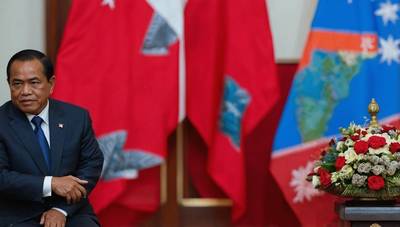Indonesia wants fair and square trade in US tariff discussions
Indonesia's senior economic minister, and its top negotiator, said that it is prioritizing its national interests in ongoing negotiations about U.S. Tariffs. It wants to have a "fair-and-square" trade relationship.
Airlangga hartarto, head of the delegation, and Sri Mulyani indrawati, finance minister, have been in the United States for the last week, negotiating proposed tariffs of 32% that the U.S. would like to impose upon Indonesia. The tariffs were put on hold for 90-days.
He said that Indonesia prioritizes national interests in the negotiation process while encouraging the strengthening bilateral relations with the U.S.
Last year, Indonesia had a trade surplus of $14.3 billion with the U.S.
The Minister did not reveal any specific details of the negotiations, but did say that they included energy supply, U.S. access to the Indonesian market, deregulation, and vital mineral and technology sharing in the agriculture, healthcare, and renewable sectors.
Both countries discussed Indonesia's national payments system and QR codes, which have been deemed by the U.S. to be a barrier to its payment companies. Airlangga said that Indonesia was open to foreign operators, such as U.S. companies Visa and Mastercard. The technical details will be discussed over a two-week period.
Indonesia has proposed to increase its imports of goods from the U.S. up to $19 Billion by switching to U.S. providers for wheat, soybeans, liquefied petrol gas, and crude. Jakarta has offered to lower non-tariff tariff barriers and propose some tax reductions for U.S. products.
Airlangga, Indonesia's Minister of Trade, said that such a proposal was not a "zero-sum game" to other trading partners. He also promised Indonesia would buy other products in the affected countries.
Indonesia hopes that President Donald Trump will reward its quick decision to negotiate instead of retaliate. Sri Mulyani, the head of its delegation, said that Trump could favor "first movers" as long as he remained in charge.
Sri Mulyani, who was at the IMF/World Bank spring meetings in this week, said that she had "compared notes" about her negotiations with countries affected by high U.S. import tariffs. She also said that Washington had asked the Association of Southeast Asian Nations about its response to U.S. Trade Policy as a group.
The Indonesian delegation met with U.S. officials, businesspeople in semiconductor sectors, and executives from companies such as Google, Amazon and Microsoft.
Sri Mulyani warned on Thursday that U.S. Tariffs and their impact upon global economic growth may hurt Indonesia's expansion. She expects steady growth of 5% this year, just slightly below the 5.2% government target. (Additional reporting and editing by Martin Petty, Jacqueline Wong and Ananda Teresia)
(source: Reuters)





